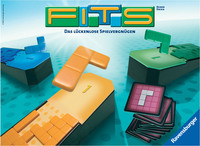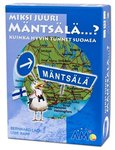June 2009 Archives

I got myself a copy of FITS, the Tetris-like game from Ravensburger. It's a fun little puzzler, where players must fill up the space with polyominoes - like Tetris bits, but this game also includes those with three or five squares. Each tile will appear exactly once in a random order and the rules are slightly stricter than in Tetris, since there's no moving sideways. Badly placed tile will block a lot.
There are four rounds, each with a different scoring rule. In each round, every empty spot is one negative point. In the first round, extra points are awarded for completed rows. In the second, for spaces with point values. In the third, there are positive spaces and very negative spaces. In the last one there are pairs of symbols: if both are showing, it's points, but if only one is out, it's negative.
It's very simple and plays relatively quickly. It's very multiplayer solitaire, the number of players doesn't matter a bit. The rule book includes a scoring scale for solo play. However, I don't find the solo game that interesting - the game is more fun with other people. It's not brilliant, but so far I like it. What's even better, Nooa liked it a lot and had great fun playing with the (sturdy plastic) tiles. That might be the reason to keep the game.

Yesterday I played a game of Steam. Again we had three players on the US board, but this time using Basic rules. Those are actually pretty good! Of course, they remove quite a bit of the tension, as the auction is gone and the money is a lot easier (no loan-taking in advance, just go down on the income track when - and only when - you need cash). The basic game is still the same, though: get a good engine, build flexible track, secure cubes for future deliveries.
So, in some ways the basic game makes things easier - new players will need to do less challenging forward planning - while keeping the game interesting. It's not a bad mix, and I wouldn't mind playing the Basic game again. My preference is still the Advanced game.
In our game experience paid off. I built a gorgeous network - a large ring of about 4-5 cities and 4-5 towns, then urbanized another city outside the circle and connected it several times to my ring and for the final touch built a route across the ring. In the end, I would've had six-link deliveries for two or three turns more. It was very pleasing to build. Final scores were about 79, 73, 59 or so, so it wasn't a slaughter or even a particularly obvious victory in the end, thanks to the split income and VP tracks. In Age of Steam, this would've been brutal.
The new version of my board game web site is now open. Lautapelaaja.net is gone, welcome Lautapeliopas, more modern - some might say Web 2.0 - version. Just about everything from the old site is present on the new and I've also added the contents of my board game book, updated and refreshed. I've also recruited more people to write content and added some stuff to make participating more interesting - visitors can now rate games and comment everything, for example.

Steam is an interesting variant of Age of Steam. It won't make AoS obsolete, but it seems to stand quite well in comparison.
Things I like about Steam: the new income system where income can be changed into cash creates a whole new financial environment in the game. It's not quite as strict as in AoS, but interesting, definitely. New maps are always a new challenge. I've tried the US map, and the terrain there is quite challenging. It's good to have two different ways to play; I haven't tried the Basic game, but I think it's interesting.
Things I don't like: the graphic design is occasionally quite ugly. The game looks nice, but I prefer the clarity of Age of Steam. With three players the game seems a tad too loose.
So, overall a positive experience. I rated the game as 9 in Geek: not quite as good as Age of Steam (which I rate a full 10), but very good. They haven't ruined the solid foundation.
We played a three-player game yesterday and as I said, it feels a bit too loose. SInce they've made Urbanization and City Growth (used to be Production) better, there are more good actions. Of course, nothing beats Locomotive, but still. I think the first expansion should include a map for six players and a map and perhaps some changes to rules for three players.
In our game, I dominated the early game. By the time the other two were running two-link engines, I was already at five with a network that can use such an engine. At that point a first-time player expressed his frustration and I offered to swap places with him. That we did, and I proceeded to win the game from his hopeless position...
Well, not quite. We had to quit two turns early (having played for two hours at that point), at which point he won 45-35 or something like that. I'm not sure if I could've won, since while we all had six-link engines at that point and I had built a very good network, he had perhaps slightly more cubes to run. Hard to say what would've happened, I didn't count how many six-link runs I had left. With enough of those I might've won.
In any case it was an interesting experience and it made the game much more interesting, as I would've won the game quite easily without the swap, I think. Incidentally Petri didn't complain as much, but his position was much worse and I'm not sure if I could've done much if I had swapped with him.
It seems to me that it's slightly easier to succeed in Steam, as the financial system is more merciful. I was behind when we swapped, but I took plenty of money out, worked hard, paid back the debts and was fighting for the win by the end of our game, I'm not sure if it would've worked out that well in Age of Steam.

I asked for a review copy of Fits, but Amo provided me with a copy of Miksi juuri Mäntsälä...? instead. Well, that's an interesting game, too. It's the Finnish version of Ausgerechnet Buxtehude.
These games owe their existence to Anno Domini. In Anno Domini, players must put events in correct chronological order. These games add another dimension: cities and locations must be put in correct geographical order. There's a starting city and the rest will be played on the north-south or east-west axis related to that city.
So, let's say you start with Tampere. I then get a city, and must place it north, south, east or west of Tampere. If someone thinks I've made a mistake, they can turn over the cards and check. The player who's wrong pays a point to the one who's correct, and wrongly played cards are removed. Then it's next player, who gets a card and must place it on the board. Again, it must be placed relative to Tampere so that all cards form a cross on the board (not a matrix, that would be unnecessarily complicated), but of course the new card can be placed between two cards already in play.
This goes on for 15 cards, then there's a "Intermezzo" phase where everybody must guess how many cards are placed incorrectly. Guess right and you'll earn two points, otherwise the closest guess will get one point. The game is reset and new starting city is chosen. This is repeated three times and then it's game over.
It's all very simple and entertaining. This is a family game, so player without points isn't eliminated, they just don't pay (recipient gets the points from the pool in that case). The whole ordeal takes about 20 minutes or so. The game uses 45 cards each time and there are about 200 cards included in the game, so it's not likely to get repetitive soon.
We played the game last Thursday and while everybody wasn't quite as eager to play, I dare say we all had fun. The whole "I doubt you" element is of course familiar and definitely a good one, as it encourages bluffing and table talk. It also encourages interesting play, as often one axis is trickier than the other - everybody knows that Kolari is north from Helsinki, way north, but how about the east-west direction? It's far less obvious.
There are obvious problems with the game, as it's a fairly pure trivia game. If one player is worse than others, the player sitting on his left will triumph as she gets the first call on his mistakes. If one players is much better than the others, victory should be easy.
The first problem can be fixed, sort of, by replacing the rigid turn order with free order to doubt - the first to call it gets it - but large disparities in skill will cause the game to fail in any case. The game is certainly much better when everybody is equally skilled in Finnish geography (of course, if the players know different parts of Finland well - as is often the case in university circles where I play most of my games - that just makes the game better).
Miksi juuri Mäntsälä...? is an educational, yet entertaining game. It has an instant charm I like, the game is easy to play and fun. It is also very good choice to offer for casual gamers and I think the game is more captivating than many people might think - the game is more fun than it sounds like.
